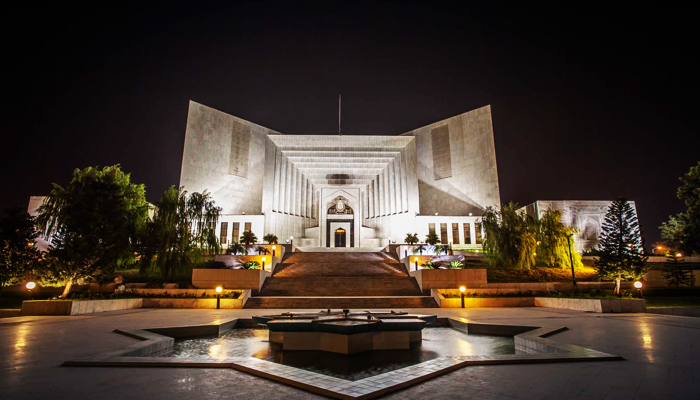SC seeks govt's reply in contempt case against Imran Khan
CJP Bandial asserts PTI's intentions were to always move toward D-Chowk
ISLAMABAD: The Supreme Court of Pakistan on Friday questioned the federal government regarding its need to file the contempt of court case against PTI Chairman Imran Khan stating that the court will take action if considered necessary following "reports of law enforcement agencies".
Headed by Chief Justice Umar Ata Bandial, a five-member bench of the top court conducted a hearing of the contempt case against the former premier. During the proceedings of the case, Khan's counsel Salman Akram Raja and the interior ministry's lawyer Salman Aslam Butt were present in the court.
Raja, before presenting the former prime minister's arguments, informed the court about the submission of his response to the government documents.
Interior ministry's council Butt said that the PTI chairman gave a call for D-Chowk on May 24. There is data proving that Khan was aware of the Supreme Court's orders and that they have submitted a USB with the PTI leaders' statements, establishing their awareness of the SC verdict, he added.
Justice Mazahar Naqvi questioned how they could distinguish the truth from the lie, adding that the Supreme Court is not a trial court that can record statements.
Justice Naqvi said that the matter the application tends to has been rendered moot. He added that matter of contempt is between the court and the contemnor.
He added that the court could issue a contempt notice in light of the agencies' reports if needed. He questioned why the government felt like filing a contempt case against the PTI chief.
It is the SC’s duty to carry out contempt proceedings if needed; the government can only offer assistance, he said.
The interior ministry argued that the contempt proceedings are a continuation of the top court’s verdict regarding the PTI long march's entrance to the Red Zone.
The chief justice said that Khan claimed there was chaos on May 25 and protesters were out of control. However, it looks like the PTI leader did not go to the D-Chowk himself but asked his supporters to do so, he added.
Justice Bandial also said that the PTI's intentions were always to go to the D-Chowk, and the PTI lawyers convinced the court that barriers were lifted. However, later they did not honour their commitment and turned to the D-Chowk, he added.
-
Security forces gun down 30 terrorists in multiple IBOs in KP: ISPR
-
MQM-P calls for new province in Sindh
-
US report validates Pakistan military edge over India: PM
-
Banned TTP poses serious threat to Pakistan security: UNSC panel
-
CM Afridi clarifies remarks on by-poll after ECP requests army deployment
-
Dubai sees 3.2m Pakistani passengers in 2025 as airport sets new milestone
-
Security forces kill 23 Indian proxy terrorists in KP's Kurram
-
Pakistan to construct island to boost oil exploration: report












